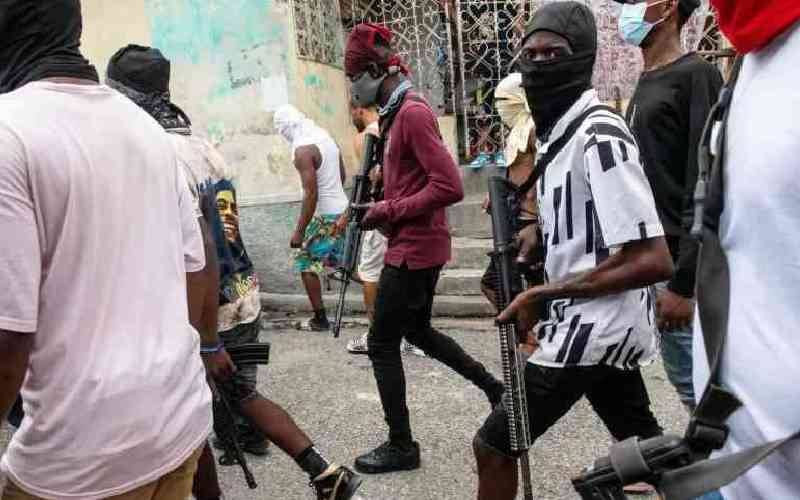Every police station is expected to receive a trained dog in the new financial year that starts in July, as President Uhuru Kenyatta’s Government takes the fight against the nightmare that is the country’s insecurity a notch higher.
When he rises to read out the next financial year’s Budget next month, Treasury Cabinet Secretary Henry Rotich will also tell Parliament that the Government will hire an additional 10,000 teachers, 14,000 police officers and distribute food to 1.6 million needy people.
The Sh2.1 trillion Budget will further allow the Jubilee administration to extend its care for prisoners, with the Government setting aside money to buy 54,000 blankets and 10,000 pairs of shoes for the thousands of inmates serving time.
Pro-Poor programmes
According to Kenya’s most ambitious Budget yet, the Government has made its intentions to deepen pro-poor programmes clear by increasing the number of households under the cash transfer programme from 490,000 to 710,000.
Mr Rotich is also expected to highlight plans to construct a National Employment Promotion Centre in Kabete, Kiambu County, to deal with the high levels of unemployment among the youth.
Taxpayers will additionally pay for two weather surveillance radars to be used by the meteorological department, and two aircraft for the police.
Rotich will address the new policy in infrastructure — dubbed by some as an ‘enjoy now, pay later’ policy — which will see the construction of 8,000 kilometres of new roads over the next four financial years.
In 2015-16, the State Department of Transport intends to construct 350km of new roads through normal development allocation, and 3,000km under an annuity programme.
Before announcing the new taxation measures the Government will use to raise the revenue required to fund the Budget, Rotich will likely mention the Government’s plans to supply sunscreen to 3,500 people living with albinism, and provide assistive and supportive devices and education scholarships for 4,000 persons living with disability.
Flagship projects
A deeper study of the Budget shows the Government has rewarded the ministries and commissions that support its flagship programmes with increased funding.
The biggest winner in the next financial year, which begins July 1, is transport, with the sector receiving the largest increase in funding year-on-year — a 260 per cent boost to hit Sh164 billion — of the 47 departments and commissions run by the national government.
The jump was mainly a result of a Sh146 billion allocation to the Kenya Railways Corporation for the Standard Gauge Railway (SGR) project. In the current financial year, the project received Sh26 billion.
With the additional funding, Kenyans should expect 95 new kilometres of railway line to be laid, as well as construction of 400 housing units to relocate households that have encroached on the Kenya Railway property.
Stay informed. Subscribe to our newsletter
The Tourism department is the second-biggest beneficiary of the new Budget. The ailing industry will receive Sh10.9 billion — a 127 per cent jump from the current allocation. Of this cash, Sh7.1 billion will go towards tourism promotion and marketing, a five-fold increase from Sh1.2 billion. The Salaries and Remuneration Commission (SRC), which has been at the forefront of the push to reduce the public sector wage bill, will see its budget more than double, largely to pay salaries and run its offices.
SRC comes in third among institutions that will receive the highest growth in budgets year-on-year at 109 per cent, with its allocation increasing from Sh306 million to Sh922 million. On the flip side, Industrialisation Cabinet Secretary Adan Mohammed’s docket has received the only budget cut among Government ministries.
According to the Budget estimates approved by Cabinet last month, the Ministry of Industrialisation and Enterprise Development will receive 27 per cent less cash — from Sh10.7 billion to Sh7.7 billion.
But it is the Independent Electoral and Boundaries Commission (IEBC) that will receive the biggest budget cut after its allocation was slashed 39 per cent to Sh3.7 billion.
IEBC is already grappling to find funds to carry out voter registration, and has been saddled with a Sh4.8 billion bill presented by suppliers, following the 2013 elections.
Cash allocation
The National Police Service Commission, the Commission for the Implementation of the Constitution, the National Land Commission and the Public Service Commission are the other commissions that should brace for a budget cut, with their new allocations contracting 33, 31, 9 and 1 per cent, respectively.
Rotich is expected to read the Budget statement in three weeks’ time, which is when he will outline new taxation measures to fund the expanded spending plan.
For the first time, the Budget Policy Statement includes outputs and targets in line with a parliamentary directive to boost accountability. This gives the public a rare glimpse at the actual deliverables the Government has planned for the new financial year.
However, several departments, including Defence, which tends to provide opaque budgets on the grounds of national security, had generalised allocations that still make it difficult for taxpayers to know what their hard-earned money is paying for.
The Teachers Service Commission (TSC), which has the biggest allocation of any commission, Government department or ministry, will hire an additional 10,000 teachers from its Sh188 billion.
The State Department for Interior has been allocated Sh9.5 billion more in the new financial year, a 10 per cent increase to Sh102.4 billion. Part of this budget will buy one police dog for every police station, and two additional aircraft in the year.
Inspector General of Police Joseph Boinett’s men in uniform will use Sh25.3 billion to pay for tea, toilet paper and other office supplies under the use of goods and services budget. The department will also spend part of its cash to instal an additional 100 CCTV cameras in Nairobi, Mombasa, Kisumu and Nakuru.
Community policing will also get a share of the funding. In the next fiscal year, security chiefs are targeting to establish partnership policing programmes in 90 sub-counties. This investment is expected to lower Kenya’s crime index from 180 cases to 170 per 100,000 people.
The Anti-Stock Theft Unit has also set an ambitious target of reducing the number of reported cattle theft and related crimes by 100 per cent.
Kenyans should also expect that with the huge investment in the security docket, police from the Rapid Deployment Unit (RDU) will arrive at a scene of insurgence within 30 minutes after receiving orders.
On its part, the State Department for Co-ordination of National Government, which will have Sh17.9 billion to spend, has some goodies for visitors of the State.
The department, which is mandated to provide correctional services, plans to dish out 20,000 uniforms to offenders, with 10,000 prisoners expected to receive a new pair of shoes. The Government also plans to send 54,000 blankets, 15,000 mattresses, 270,000 bar soaps, 240,000 toilet papers and 52,000 sanitary towels to inmates.
The department is constructing 17 new prisons from this year’s budget, which are at different stages of completion, as well as a Borstal Institution (BI), a youth detention centre, for girls at Kamiti.
Street families
The State Department for Planning, which has been allocated Sh81.5 billion, a 16 per cent increase, will in the new fiscal year establish 10 more Huduma Centres, with a target of having 33,660 citizens access services from these one-stop facilities. A total of Sh2.5 billion has been allocated to run the centres in the year.
The State Department for Devolution has been allocated Sh11.6 billion, up from Sh9.1 billion. The ministry plans to provide 3,500 street families with rescue facilities, education and vocational skills, as well as re-integrate them with their families.
The Sh81.7 billion for the Education department will fund 9.2 million pupils in public primary schools, with another 2.3 million students receiving free day secondary education.
The Ministry of Health’s budget has grown 19 per cent to Sh59.1 billion to allow it achieve its ambitious target of serving 35 million under free primary healthcare. The ministry also targets to have at least seven healthcare workers per 100,000 people within the financial year.
 The Standard Group Plc is a
multi-media organization with investments in media platforms spanning newspaper
print operations, television, radio broadcasting, digital and online services. The
Standard Group is recognized as a leading multi-media house in Kenya with a key
influence in matters of national and international interest.
The Standard Group Plc is a
multi-media organization with investments in media platforms spanning newspaper
print operations, television, radio broadcasting, digital and online services. The
Standard Group is recognized as a leading multi-media house in Kenya with a key
influence in matters of national and international interest.
 The Standard Group Plc is a
multi-media organization with investments in media platforms spanning newspaper
print operations, television, radio broadcasting, digital and online services. The
Standard Group is recognized as a leading multi-media house in Kenya with a key
influence in matters of national and international interest.
The Standard Group Plc is a
multi-media organization with investments in media platforms spanning newspaper
print operations, television, radio broadcasting, digital and online services. The
Standard Group is recognized as a leading multi-media house in Kenya with a key
influence in matters of national and international interest.









